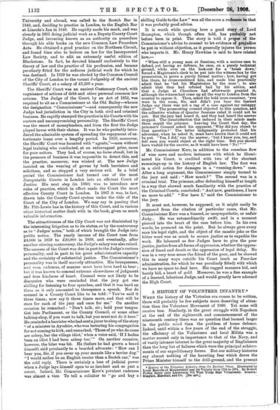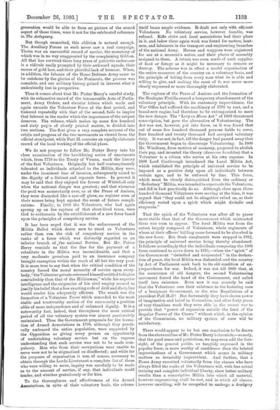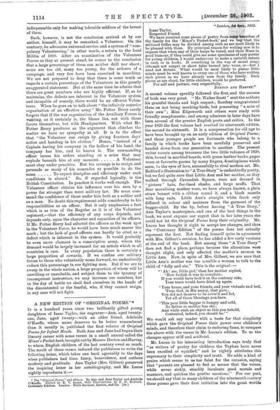A HISTORY OF VOLUNTEER INFANTRY.*
WHEN the history of the Victorian era comes to be written, there will probably be few subjects more deserving of atten- tion than the Volunteer Movement of 1860. Yet none will receive less. Similarly, in the great struggle with Napoleon at the end of the eighteenth and commencement of the nineteenth century there was no question that loomed larger in the public mind than the problem of home defence. Indeed, until within a few years of the end of the struggle, the efficiency of the Volunteers and local Militia was . a matter second only in importance to that of the Navy, and of vastly intenser interest to the great majority of Englishmen than the long list of failures which were the principal achieve- ments of our expeditionary forces. But our military histories say almost nothing of the haunting fear which drove the Prime Minister himself to the drill-ground, and the present • Iluttory of the Volunteer Infantry from the Earliest Times. Illwaratad by Local Records of Iluclderafield and ate Vicinity from 1794 to 1874.. By Robert Potter Barry (late Lieutenant 9th West Yorks Rifle Volunteers). Loudon: 8impkin, Marshal, and Co. L258. uet.a generation would be able to form no picture of the armed aspect. of those times, were it not for the celebrated reference in The Antiquary.
But though unmerited, this oblivion is natural enough. The Auxiliary Forces as such never saw a real campaign. Theirs was an uneventful record of service, the monotony of which was in no way exaggerated by the complaining Gibbon. All that has survived those long years of patriotic endeavour is ,a ridicule easily prompted by their awkward squads, their excess of gold lace, and their plentiful lack of humour. When, in addition, the labours of the Home Defence Army came to be outshone by the glories of the Peninsula, the process was complete, and our military history gained in interest what it undoubtedly lost in perspective.
Thus it comes about that Mr. Potter Berry's careful study, with its exhaustive record of the innumerable Acts of Parlia- ment, Army Orders, and circular letters which made and again unmade the Volunteer Force of the first period, and tinkered repeatedly with that of the second, fails to inspire that interest in the reader which the importance of the subject deserves. The volume, which makes up some five hundred and sixty pages of closely printed matter, is divided into two sections. The first gives a very complete account of the origin and progress of the two movements as viewed from the official standpoint, while Part II. contains an equally elaborate record of the local working of the official plans.
We do not propose to follow Mr. Potter Berry into his close examination of the bewildering series of enactments which, from 1778 to the Treaty of Vienna, mark the history of the first Volunteers. Originally but half contemptuously tolerated as individuals attached to the Militia, they were, under the imminent fear of invasion, subsequently raised to the dignity of a distinct and separate force. In general it may be said that they enjoyed the favour of Whitehall only when the national danger was greatest; and that whenever the peril was momentarily over, as at the Peace of Amiens, they were discarded like a cast-off glove, no register even of their names being kept against the event of future compli- cations. Finally, in 1808 the Volunteers, who had again sprung up on the rupture of that short-lived truce, were bled to euthanasia by the establishment of a new force based upon the principles of compulsory service.
It has been urged that it was the enforcement of the Militia Ballot which drove men to enrol as Volunteers rather than run the risk of compulsory service in the ranks of a force which was distinctly regarded as an inferior branch of the national Service. But Mr. Potter Berry reminds us that the fine for the payment of a substitute in the Militia was inconsiderable, and that a very moderate premium paid to an insurance company brought exemption within the reach of all but the very poor. It is more true to say that when the critical condition of the country forced the moral necessity of service upon every- body, "the Volunteer private esteemed himself entitled to higher comradeship than that of the Militiaman," while his superior intelligence and the exigencies of his civil employ seemed to justify his belief that a less exacting code of drill and discipline would render him adequately efficient. The result was the formation of a Volunteer Force which conceded to the most stable and trustworthy section of the community a position alike of more independence and of enhanced dignity. It is a noteworthy fact, indeed, that throughout the most critical period of all the voluntary system was almost passionately maintained. Thus the Government proposals for the forma- tion of Armed Associations in 1798, although they practi- cally embraced the entire population, were supported by the Opposition as giving every person an opportunity of undertaking voluntary service but on the express understanding that such service was not to be made com- pulsory. Men who from their occupations were unable to serve were not to be stigmatised as disaffected ; and while for the purposes of organisation it was, of course, necessary to obtain through the Lords-Lieutenant a complete list of those who were willing to serve, inquiry was carefully to be made as to the amount of service, if any, that individuals could tender, and whether gratuitously or for hire.
To the thoroughness and effectiveness of the Armed Asaociations, in spite of their voluntary basis, the scheme itself bears ample evidence. It dealt not only with efficient Volunteers. No voluntary service, however humble, was refused. Rifle clubs and local associations had their place in it, and below these again work was found for carters, boat- men, and labourers in the transport and engineering branches of the national Army. Horses and waggons were registered for use at a moment's notice, and their places of assembly assigned to them. A return was even made of such supplies of food or • forage as it might be necessary to remove or destroy. The scheme was in effect a model organisation of the entire resources of the country on a voluntary basis, and the principle of taking from every man what he is able and willing to give, and making the most of it, was never more clearly expressed or more thoroughly elaborated.
The rupture of the Peace of Amiens and the formation of the Boulogne Flotilla caused a temporary abandonment of the voluntary principle. With its customary improvidence, the War Office had suffered the machinery of 1798 to rust, and a brand-new engine had therefore to be extemporised to meet the new danger. The " Levy en Masse Act " of 1803 threatened conscription, but gave the alternative of Volunteering. The Act was not, however, put into force, as it was found that out of some five hundred thousand persons liable to serve, four hundred and twenty thousand had accepted voluntary duty. It was not, in fact, till the danger had passed away that the Government began to discourage Volunteering. In 1806 Mr. Windham, from motives of economy, proposed to abolish their pay, and invented the theory (damnosa hereditas) that a Volunteer is a citizen who serves at his own expense. In 1808 Lord Castlereagh introduced the Local Militia Act, which established the principle of universal service to be imposed as a positive duty upon all individuals between certain ages, and to be enforced by fine. This force, which must be clearly distinguished from the ordinary or " Sedentary" Militia, was intended to supersede the Volunteers, and did in fact practically do so. Although close upon three hundred thousand Volunteers were serving at the time, it was argued that " they could not be altogether relied on, as their efficiency rested upon a spirit which might dwindle and evaporate."
That the spirit of the Volunteers was after all to prove more stable than that of the Government which mistrusted them was soon to appear. The local Militia was from the outset largely composed of Volunteers, whole regiments of whom at their officers' bidding came forward to be absorbed in the new force. But fresh enrolments were stopped in 1812, the principle of universal service being thereby abandoned. It follows accordingly that the individuals composing the 1808 force continued to serve down to 1815,—when the " spirit " of the Government " dwindled and evaporated " in the declara- tion of peace, the local Militia was disbanded, and the country by Act of Parliament sank back to its old condition of un- preparedness for war. Indeed, it was not till 1860 that, at the recurrence of old dangers, the second Volunteering movement forced the band of the Government, and called itself into existence. Even now it can scarcely be said that the Volunteers owe their existence to the fostering care of a benignant Government, or the wise Regulations of a provident Pall Mall 1 But fortunately they have shown power of imagination and belief in themselves, and after forty years of very thankless work they were able in the recent war to provide that "power of expansion outside the limit of the Regular Forces of the Crown " without which, in the opinion of the Commission, no military system of ours will be satisfactory.
There would appear to be but one conclusion to be drawn from the above outline of Mr. Potter Berry's chronicle,—namely, that the good sense and patriotism, we may even add the fore- sight, of the general public, as tangibly expressed in the popular force, is more worthy of confidence than the belated improvisations of a Government which seems in military matters so invariably improvident. And further, that a Home Army recruited voluntarily from the classes who have always filled the ranks of the Volunteers will, with less actual training and complete individual liberty, show better military results than a conscriptive Militia into which all material, however unpromising, shall he cast, and in which all classes, however unwilling, will be compelled to undergo a drudgery indispensable only for making tolerable soldiers of the lowest of them.
Such, however, is not the conclusion arrived at by our author, himself, it may be remarked, a Volunteer. On the contrary, he advocates universal service, and a system of " com- pulsory Volunteering," in other words, a return to the local Militia of 1808. After an examination of the Volunteer Forces as they at present stand, he comes to the conclusion that a large percentage of them can neither drill nor shoot ; some are too old, many too young, for the ardours of a campaign, and very few have been exercised in marching. We are not prepared to deny that there is some truth as regards a certain percentage of the Volunteers in this greatly exaggerated statement. But at the same time he admits that there are great numbers who are highly efficient. If, as he maintains, the defects are inherent in the Volunteer system and incapable of remedy, there would be no efficient Volun- teers. When he goes on to talk about " the infinitely superior organisation of an effective army " Mr. Potter Berry surely forgets that if the war organisation of the Auxiliary Forces is wanting, as it certainly is, the blame lies, not with those forces themselves, but with Headquarters. With what Mr. Potter Berry produces as the argument that clinches the matter we have no sympathy at all. It is to the effect that "the Volunteer can resign by giving fourteen days' notice and handing in his clothes." Hence, " instead of a Captain having his company in the hollow of his hand, the company has him, and be knows it. The commanding officer issues his orders standing on a mine that may explode beneath him at any moment A Volunteer must obey under penalties. But his revenge is to resign and persuade as many of his comrades as possible to do the same To expect discipline and efficiency under such conditions is absurd." So, if regarded logically, is the British Constitution. In practice it works well enough. The Volunteer officer obtains his influence over his men by a power far stronger than mere military law. He must com- mand the confidence of those under him both as a soldier• and as a man. No doubt this requirement adds consideraby to his responsibilities as an officer. But it only emphasises a fact which is as true of the Regular as it is of the Volunteer regiment,—that the efficiency of any corps depends, and depends only, upon the character and capacities of its officers. If Mr. Potter Berry had selected the officers as the weak spot in the Volunteer Force, he would have been much nearer the mark ; but the lack of good officers can hardly be cited as a defect which is inherent in the system. It would probably be even more clamant in a conscriptive army, where the demand would be largely increased for an article which in all countries is rare. In every population there is certainly a large proportion of cowards. If we confine our military forces to those who voluntarily come forward, we undoubtedly reduce this percentage in our fighting men. But if we are to sweep in the whole nation, a large proportion of whom will be unwilling or unsuitable, and subject them to the tyranny of incompetent instruttors, we may increase our numbers, but in the day of battle we shall find ourselves in the hands of the discontented or the fearful, who, if they cannot resign, in any case will not fight.








































 Previous page
Previous page